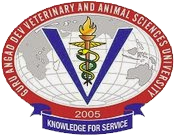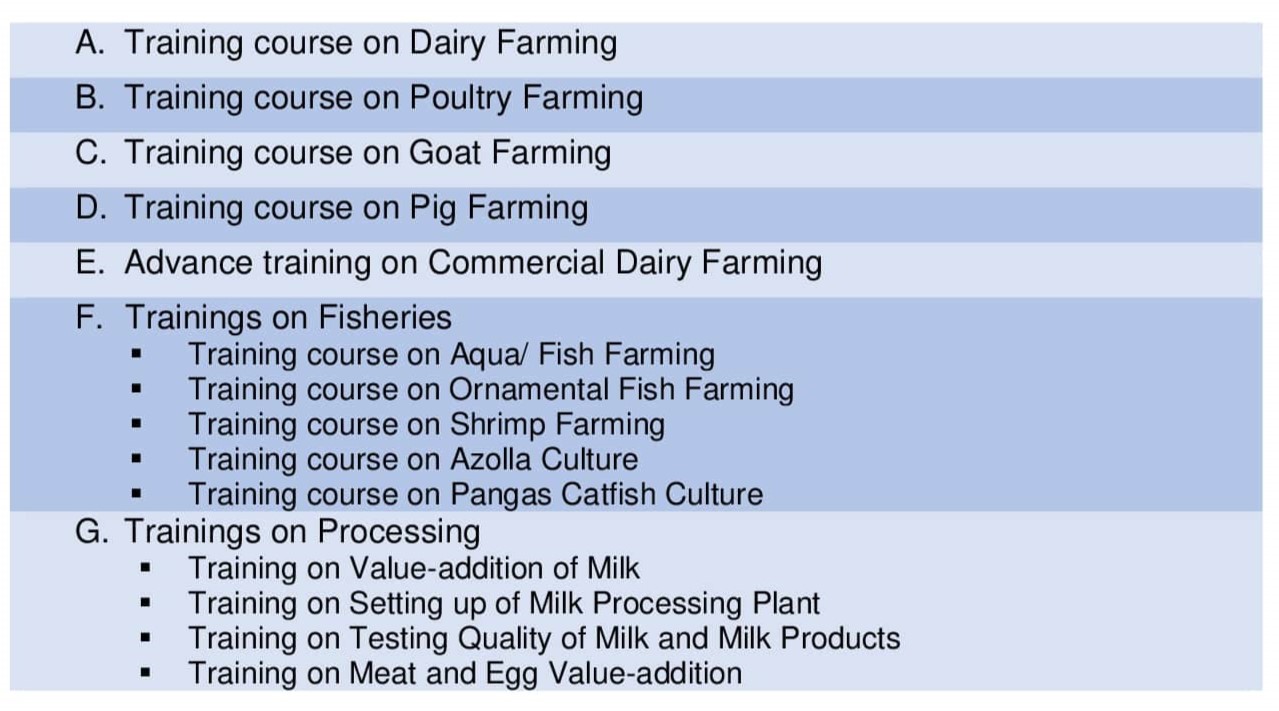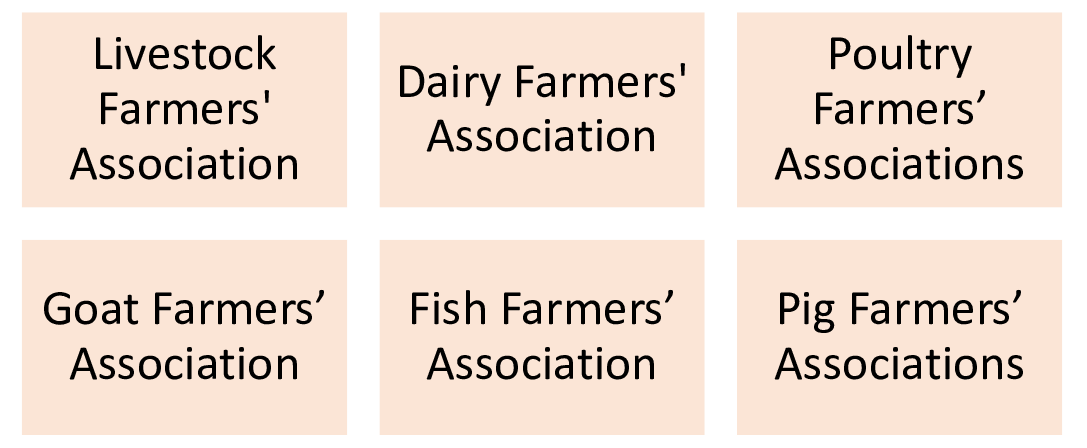

New technologies developed in different areas of Veterinary, Animal Sciences, Poultry & Fisheries are effectively communicated to the livestock farmers- the ultimate beneficiaries of such technologies. The extension services also help in identifying the problems faced by the livestock farmers and provide new research issues to the scientists. The technologies are effectively transferred through following activities:
Pashu Palan Mela is organized in the months of March and September every year at Ludhiana campus. More than 50,000 farmers visit the venue on each day of this flagship event of the Directorate of Extension Education. Various departments of the university exhibit new technologies/ innovations for use in livestock, fish and poultry farming. Industry and line departments also participate in the mela to showcase their technologies and products.
Participation is also ensured in the Kisan Melas organized by Punjab Agricultural University at its Regional Research Stations and Krishi Vigyan Kendras in different parts of Punjab.
The major objectives of these Pashu Palan Melas are
Livestock shows in the form of breed competitions as well as milking competitions are also organized by the Directorate of Extension Education to create awareness on indigenous breeds and encourage the development of sportsmanship, social relationships, leadership and confidence among livestock farmers. These shows motivate the farmers to start new ventures and to improve the existing farming enterprises into more profitable business.
The innovative technologies and research achievements of the University are showcased in exhibitions organized at the occasion of seminars, conferences, workshops, special occasions etc. Conservation of natural resources, mitigation measures to counteract ill effects emerging due to climatic changes and location specific integrated farming system models are stressed upon in these exhibitions. Videos of certain specific problems of animals are played at the occasions. Area specific mineral mixture, Uromin licks, bypass fat, Mastitis detection kits, Literature and other inputs are sold to the needy farmers. New technologies, technical novelties or innovations are displayed on posters at the occasion
The organization of awareness camps is helpful for disseminating information on general health and production issues. Various subject matter specialists deliver their lectures on specific topics in these camps. KVKs/ RRTCs organise such camps on a regular basis.
Animal Health Camps cum Awareness Camps are organized by various departments of the University under the aegis of Directorate of Extension Education. Poor and marginal farmers benefit the most from these camps. Certain Gram Panchayats, NGOs, Cooperative Societies (Milkfed and Markfed), Government or Semi-Government Agencies (PAU, KVKs, ATMA) and Banking Institutions, sometimes, sponsor these camps
1.Trainings on the main Campus:
These trainings are mainly concerned with enhancing the ability of an individual to accomplish a set of tasks by providing an opportunity which results in acquiring the new and upgraded ability in performing the skill. The directorate organizes specialized training courses for dairy, poultry, piggery, fish farming and value addition of livestock produce for the farmers, army personnel and for persons related with other animal welfare agencies to transfer new technologies evolved by the university. Following is the list of these trainings.

2. Collaborative Trainings:
The Directorate has liaison with regional and national institutes and organizations such as MANAGE and line departments for training professionals and farmers from all over the country. These trainings are an ideal platform for generating knowledge and new avenues in research and extension.
3. Regional trainings:
The Regional Research and Training Centres have been instrumental in dissemination of knowledge and transfer of technologies. Trainings are regularly conducted for hastening adoption of new practices and technologies by the farmers and self-help groups in Kandi and Bet areas of the State
4.Capacity Building of Field Functionaries
The Directorate conducts workshops for the officials and field functionaries of the State Departments of Animal Husbandry, Dairy Development and Fisheries Departments, Directorates, Dairy Co-operative Federation, Banking and other Development Departments/ Agencies related with animal welfare. Demand based short term and long-term training programmes are also organized for updating the field officers. Such workshops also provide platform for the interaction of scientists of the University with field functionaries which help the University to do farmer-oriented research.
C. Documentation of success stories and special studies:
Implementation of technologies developed by the University generates a number of success stories across the state involving all kinds of livestock. The typical success stories need to be replicated to enhance the sustainability of the technologies. This often proves as a stimulus for the ordinary farmers to undertake enterprising activities in different spheres of livestock farming. Print and electronic media is tapped to disseminate the success stories to as large a number of farmers as possible
D. Establishment of Entrepreneurs’ Associations
The extension services in the University have provided a platform for the establishment of different categories of Farmers’ Associations with necessary technical support of the University. The following associations are operational at present:

These associations develop and implement the programmes for the improvement and conservation of livestock to improve the economy of different livestock farming systems by adopting latest technologies. These associations also collaborate with sister associations in other states having similar breed improvement programmes of different species and also exchange the germplasm for extensive testing and evaluation in order to increase reliability and the genetic progress and to test the improved germplasm of different species in different regions of the country. Monthly seminars for the farmer members of these associations are conducted every month for knowledge sharing.
E. Electronic media
University has liaison with electronic media for flashing various livestock related interventions and precautions for disease control and seasonal correct management practices. University experts deliver TV talks regularly on Doordarshan/ Cable networks/ private channels on current & seasonal topics related to livestock and fish farming. On an average two to three talks are delivered/broadcasted in a week. During the last 5 years, a total of 403 TV talks were telecast.
For the deep penetration of knowledge in the far-flung areas, university has developed a strong liaison with All India Radio stations at Jalandhar, Ludhiana, Bathinda and Patiala.
F. Publications
The Directorate has published over 40 books and one monthly magazine “Vigyanak Pashu Palan” for disseminating the technical information along with university recommendations to the livestock farmers. In addition, the University experts regularly publish articles along with advisories to the livestock farmers in various newspapers and magazines.
G. Consultancies/Assignments
1. Farmers Advisory Helpline-62832-58834, 62832-97919
The telephonic helpline in the Department of Veterinary and Animal Husbandry Extension Education attends to the queries of livestock owners regarding the animal health and management problems under the motto ‘you ask we reply’.
2. Farmers Information Centre:
The Department of Veterinary and Animal Husbandry Extension Education operates a Farmer Information Centre as a single window system to cater to the needs of the farmers at a single place. University publications/ extension literature and inputs are available in the Farmer Information Centre for the farmers. Farmers can also connect with Subject Matter Specialists of the University through this Centre.
H. e-Extension
Sensing the scope and popularity of cellular network, the University has launched a YouTube channel, android mobile apps and a Massive Open Online Course (MOOC) for sharing information on livestock farming and emerging concepts like precision dairy farming. Information/ recommendations/ advisories to the members of various Farmers’ Association and other registered farmers are provided through WhatsApp. A digital magazine is also uploaded on the website on a bi-monthly basis. Mobile apps and video CDs have been developed for the farmers.
I. Chief Minister Award:
To give a push to livestock farming, the university confers Chief Minister Award to innovative and progressive farmers in buffalo, cattle, goat, poultry, pig and fish farming every year. These farmers in turn become role models for fellow farmers and instigate young farmers to follow their example.